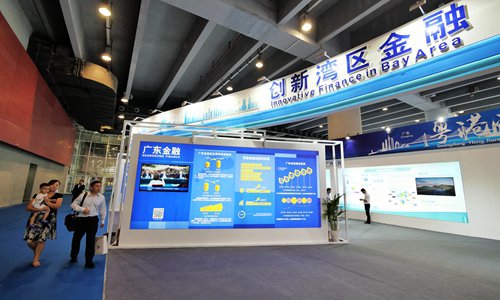Shenzhen issues tougher measures to curb home price skyrocketing
By GT staff reporters Source: Global Times Published: 2020/7/15 20:45:56

A view of the Guangdong-Hong Kong-Macao Greater Bay Area special section at the China International Financial Expo in Guangzhou, South China's Guangdong Province on Sunday. Photo: IC
The government of Shenzhen city, Guangdong, tightened its house-buying policy Wednesday to halt price rises of up to 10 percent in the post-epidemic period as the city draws growing attention as the driving force of the regional economy.The Shenzhen housing and construction bureau said that Shenzhen households with local hukou and single adults, including divorced individuals, must have settled in the city for at least three years.
They must also provide personal income tax receipts or social insurance certificates for 36 months or more before buying a home, according to the bureau's official website Wednesday. Previously, anyone with an urban residence permit could buy a home in Shenzhen.
The personal housing transfer value-added tax exemption period has been expanded from two years to three, the report said. The moves are meant to curb an overheating market.
Shenzhen's housing price has seen a rising trend in the first half of this year, with 43,586 second-hand housing transactions being completed, a 39.9 percent year-on-year growth, faster than that in Beijing, where housing transactions fell 5.8 percent, and in Shanghai home transactions posted a contraction of 8.4 percent, Wang Xiaoqiang, senior analyst of Zhuge Housing Research Center, told the Global Times.
Prices have risen due to a mismatch of supply and demand, Yan Yuejin, research director at the Shanghai-based E-house China R&D Institute, told the Global Times on Wednesday.
Analysts said that the public is generally optimistic about the coordinated development of the Guangdong-Hong Kong-Macao Greater Bay Area, and that optimism has contributed 25 percent of the price rises.
Kuang Peng, a manager with a large real estate agency in Shenzhen, told the Global Times that prices rose about 10 percent in recent months as Shenzhen became more attractive as the center of economic recovery in the post-epidemic era in the Greater Bay Area.
The Greater Bay Area's GDP reached 11.4 trillion yuan ($1.63 trillion) in 2019, higher than the reading of 8.5 trillion yuan for the Beijing-Tianjin-Hebei region, official data showed, making it one of the important engines of China's economic development.
"Undoubtedly, the policy changes will exclude some potential buyers," said Kuang. "However, these changes are probably necessary to prevent prices from being pushed up by speculation for sound long-term growth."
The policies aren't expected to attract Hong Kong residents, as the changes were designed to target those with Shenzhen household registrations, Kuang added.
RELATED ARTICLES:
Posted in: INDUSTRIES